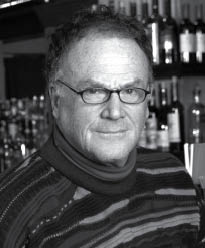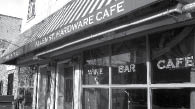Allen Street Hardware

With its warm light, cozy nooks, great food and even better bar, Allen Street Hardware would be a great corner bar with or without music. But owner Mark Goldman wasn’t going to open a joint without live music. Not a chance. Goldman is a historian who has published three books about Buffalo’s rise and fall. He teaches at Buffalo State College. What seems a lifetime ago, he led historical tours through Buffalo neighborhoods. And he’s a devoted fan of live music. He’s the man who breathed life into Chippewa Street a decade ago when he opened the Calumet Arts Cafe, a nightclub that featured national acts and sparked the neighborhood’s nightlife renaissance. When Goldman sold the Calumet and moved into an old hardware shop on Allen Street, there was no question that it would be another great, good place, and that live music would be on the docket.
Artvoice: How does a guy go from being an academic to running a live music venue?
Mark Goldman: [Laughs.] Probably my mother. She loved live music and she liked to drink…I was raised in New York and I always had music around me. For my birthday every year we went to Broadway shows. I always loved all different kinds of music, and I recognized the tremendous community-building potential that music on the street has. It just seemed natural when I opened the Calumet: It had to be a music venue or I didn’t think it could work.
AV: Who played at the Calumet?
MG: You name it. We had some old timers like Jackie and Roy and Jon Hendricks, James Moody and Milt Jackson. Leon Russell a couple times, Mose Allison a bunch of times. It was fabulous. We had the younger guys: We had Cyrus Chesnutt a couple times and Benny Green and Diana Krall. We had ’em all.
AV: When you moved to Allen, you brought the live music with you.

MG: It’s completely different here. For one, we don’t charge here. [The Calumet] was more of a nightclub situation, so there was always a door charge or cover charge or ticket price. Here we can’t be as ambitious musically because we don’t charge anyone to come in. So what we’re doing is we’re trying to find interesting local groups that tend to play roots music in their field. We have Babik, for example; it’s primariy an acoustic group that does roots in the sense that it’s mostly Django Reinhardt’s Gypsy jazz with a generous sprinkling of American jazz standards. They’re here on Wednesdays. Thursday nights I’ve been working for a year now with Doug Yeomans, and he’s a real student of traditional American roots music. He’s got a slide guitar player and a snare drum and they do everything from Charlie Patton to Hank Williams.
AV: How have your audiences been?
MG: They’ve been great, terrific. They love it. The music brings people in. Now we’re working with a terrific young band, Eric Crittenden—these guys are going to be good; they play all orginals, no covers, so we were real lucky to find them. They’re going to occasionally alternate Wednesday nights with Babik. I don’t know if you know the MC scene, but we’ve got this guy Josh Brown who’s terrific. The guy comes in, he’s got like five million records in his collection—and they’re all these old Blue Note records. He’s playing Horace Silver and he’s mixing ’em.
AV: And there’s never a cover?
MG: I think once you start charging, people don’t like it—even just a two- or three-dollar cover charge would change the vibe in a place like this. Because it’s not a music room, it’s sort of a café that has music.
|
Issue Navigation> Issue Index > v6n5: Who'll Stop the War? (2/1/07) > Allen Street Hardware This Week's Issue • Artvoice Daily • Artvoice TV • Events Calendar • Classifieds |









 Current Issue
Current Issue